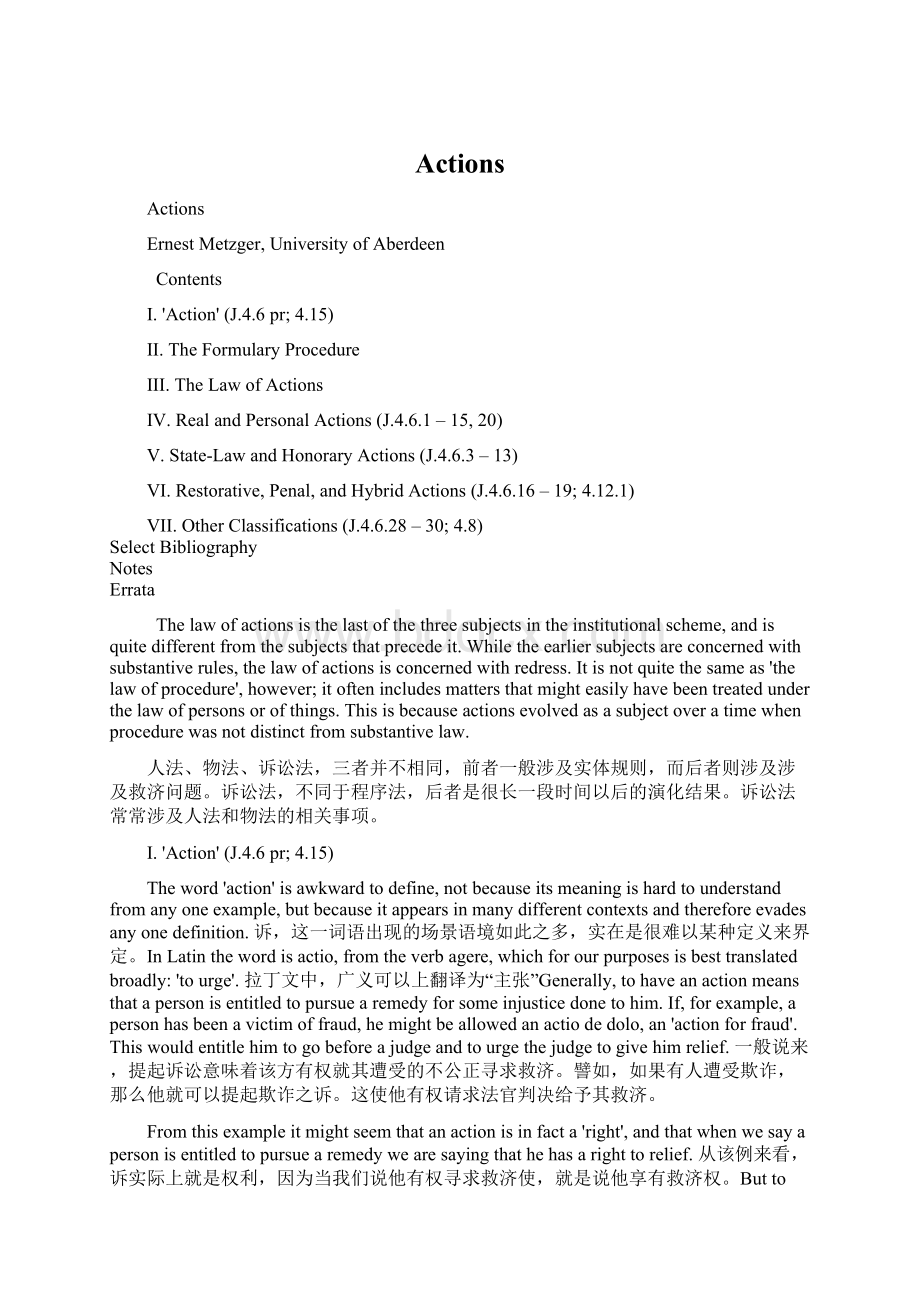ActionsWord格式.docx
《ActionsWord格式.docx》由会员分享,可在线阅读,更多相关《ActionsWord格式.docx(19页珍藏版)》请在冰豆网上搜索。

VI.Restorative,Penal,andHybridActions(J.4.6.16–19;
4.12.1)
VII.OtherClassifications(J.4.6.28–30;
4.8)
SelectBibliography
Notes
Errata
Thelawofactionsisthelastofthethreesubjectsintheinstitutionalscheme,andisquitedifferentfromthesubjectsthatprecedeit.Whiletheearliersubjectsareconcernedwithsubstantiverules,thelawofactionsisconcernedwithredress.Itisnotquitethesameas'
thelawofprocedure'
however;
itoftenincludesmattersthatmighteasilyhavebeentreatedunderthelawofpersonsorofthings.Thisisbecauseactionsevolvedasasubjectoveratimewhenprocedurewasnotdistinctfromsubstantivelaw.
人法、物法、诉讼法,三者并不相同,前者一般涉及实体规则,而后者则涉及涉及救济问题。
诉讼法,不同于程序法,后者是很长一段时间以后的演化结果。
诉讼法常常涉及人法和物法的相关事项。
Theword'
action'
isawkwardtodefine,notbecauseitsmeaningishardtounderstandfromanyoneexample,butbecauseitappearsinmanydifferentcontextsandthereforeevadesanyonedefinition.诉,这一词语出现的场景语境如此之多,实在是很难以某种定义来界定。
InLatinthewordisactio,fromtheverbagere,whichforourpurposesisbesttranslatedbroadly:
'
tourge'
.拉丁文中,广义可以上翻译为“主张”Generally,tohaveanactionmeansthatapersonisentitledtopursuearemedyforsomeinjusticedonetohim.If,forexample,apersonhasbeenavictimoffraud,hemightbeallowedanactiodedolo,an'
actionforfraud'
.Thiswouldentitlehimtogobeforeajudgeandtourgethejudgetogivehimrelief.一般说来,提起诉讼意味着该方有权就其遭受的不公正寻求救济。
譬如,如果有人遭受欺诈,那么他就可以提起欺诈之诉。
这使他有权请求法官判决给予其救济。
Fromthisexampleitmightseemthatanactionisinfacta'
right'
andthatwhenwesayapersonisentitledtopursuearemedywearesayingthathehasarighttorelief.从该例来看,诉实际上就是权利,因为当我们说他有权寻求救济使,就是说他享有救济权。
Buttoequateanactionwitharightistosubstituteaconceptthatweappreciateeasily,butthattheRomanscametoappreciateonlyovertime.将诉讼等同于权利,两者的替换对我们来说是比较容易的,但对罗马人来说则需要时间。
Wehavenodifficultyinunderstandingthatapersonundercertaincircumstanceshasaright(forexample,whenheisinjured),thatthatrighthasanexistenceintheabstract,andthatitisthefunctionofthejudicialmachinery–thejudges,tribunals,rulesofprocedureandevidence–totransformthatrightintoaremedy.一个人在特定条件下享有某种抽象的权利,这对我们来说并不存在理解上的困难,然后由司法机构将抽象的权利转化为或提供救济。
Butinasystemwherethesubstantivelawoftenspeaksinthelanguageofprocedure('
IfitappearsthatXoughttogive10toY,thejudgeshallcondemnfor10'
),andwhereprocedureisnotseenassomethingnecessarilyseparatefromtherestofthelaw,thissortofabstractiondoesnotcomeeasily.[1]但是,如果实体规则经常以程序化的语言予以表达,并且它们也还并不认为程序需要从法律中独立出来,在这样的法律制度下,对权利的抽象也就几乎不可能。
Undersuchasystem,someonewhohassufferedawrongwillprobablyseehimself,notasapersonwithsomeabstractentitlementtobemadewhole,butasapersonwhoisentitledtoclearaproceduralhurdle.如此,当一个人遭受到人身伤害时,他并不认为自己享有什么抽象的权利,而是有权清除程序上的障碍或者说有权启动司法程序。
Thisismadeveryplain<
209>
intheclassicaldefinitionofactio(Celsus,D.44.7.51)whichJustinianusesat,adefinitionthathascertainshortcomingsbutotherwiseconveyswellthelimitednotionofanaction:
Anactionisnothingbutarighttogotocourttogetone'
sdue.'
[2]这从尤士丁尼的法学阶梯以及J.4.6prCelsus,D.44.7.51中对诉的界定中可以更加清楚的认识到,尽管这一定义不无缺陷,但也向我们传递了有关诉的狭义界定:
“诉非其他,乃指一人通过法院请求其应当所得的权利”。
Thisstatementshowsclearlythatanaction,ifitisarightatall,ismorearighttoproceedthanarighttoprevail,andthatanydefinitionof'
oughttoputprocessatthefore.由此可见,诉强调的是程序,可以说是一种继续进行的权利,而非获得胜利的权利。
Accordingly,actioisoftentranslatedas'
claim'
or(circuitously)as'
rightofaction'
toshowthataperson,onpresentingcertainfacts,willbeallowedtofollowacertainproceduralagendaappropriatetothosefacts.相应的,诉也经常被翻译成请求权,即诉权,其表明一个人根据特定的事实条件可以提起特定的程序。
Thatpersonhopes,butisnotassured,thatthisagendawillculminateinthegrantingofrelief.起诉人只是期望而非确信,该程序能够是其获得救济。
英语中的司法令warrant在这一点上也于诉actio有某些相似之处。
InEnglishtheword'
warrant'
alsohassomethingofactiointhissense.
Forourpurposesitissatisfactorytodefineanactionasaclaimorawarrant.对我们而言,将诉界定为请求或司法令是恰当的。
同时,还需要提到的是,在一些情况下诉的含义会更加广泛或更加准确,而请求和司法令则不再具有解释力。
Atthesametimeitisworthmentioningthatactioappearsincontextsinwhichthemeaningiseithermorebroadormorerefined,andwhere'
or'
willnotwork.
(1)Todescribeanactionasaclaimorwarrantgivestheimpressionthatanactionrequirestheinterventionofthestate.将诉描述为请求或司法令,表明了诉需要国家的干预。
Yetthewordactiomaydescribeapurelyprivateevent,asforexampleinD.48.1.7(Macer),whereactioisusedtodescribesimplytheactofaperson,anactwhich(inthiscontext)bringsdisgraceuponthatpersonifitbecomesthesubjectofcertainproceedings.然而,诉也可能用来描述纯粹私人之间的行为,譬如在中诉仅用来描述一个人的行为,如果其成为特定程序的主体,则会被认为是丢脸的事情。
Animportantexampleofactioasaprivateeventisself-help.诉作为私人行为的重要示例就是自力救济。
Anactiomaydescribenotonlythepursuitofaremedywiththesanctionofthestate,butalsotheactofanindividualprivatelyvindicatingawrongdonetohim.诉不能仅仅被描述为寻求通过国家制裁而实施的救济,而且还指对抗自身遭受之不公的私人行为。
IntheearlierformsofRomanprocedure,forexample,thereexistedactionsforseizingapersonorhisproperty–thelegisactiopermanusiniectionemandlegisactioperpignoriscapionem(G.4.21–29)–thatapersonmightresorttowithoutpriorlitigation.在罗马早期的程式诉讼中,譬如拘禁之诉和扣押之诉,当事人可以直接寻求该种救济而不必经过起诉。
Self-helpisnotaparticularlysignificantinstitutioninthedevelopedlawofactions,butisneverthelessimportantforillustratingtheessenceoftheword'
.在诉讼法的发展进程中,自力救济并非特殊而突出的制度,但对于说明诉的本旨却很重要。
Romanlawdidnotdrawafirmlinebetweenaperson'
srealandformalclaim,thatis,betweentheclaimapersonpossessessimplybyvirtueofbeingwronged,andtheclaimrecognisedbyacourt.[3]罗马法时尚未区分当事人的实际请求和形式请求,也尚未区分一个人因遭受不公而享有的请求和又法庭确认的请求。
由此,即使未经司法机构的授予,而他也仍可请求救济Thusapersonmightpossessaclaimforredressevenifthejudicialmachineryhadnotyetgrantedittohim.
(2)Intheirtreatmentsofactions,bothGaiusandJustiniandiscussagreatdealmorethansimply'
claims'
andforthisreasonweoftenunderstandtheideaof'
actions'
quitebroadly.盖尤斯和尤士丁尼在谈论诉时,并不仅仅是指请求,正因如此,我们也经常在相当广泛的意义上的理解诉的含义。
Gaius,forexample,devotesafairamountofspacetoprocedure,andevendiscussesaformofprocedurethatwasallbutunusedinhisowntime.盖尤斯花了很大的力气来讨论程序,甚至讨论在他那个时代已经不再适用的程序格式。
Justinian,thoughhedoesnotspeakdirectlyabouttheearlierformsofprocedure(whichwereobsoletebyhistime),doesspeakaboutmoregeneralmattersoflitigation,forexample,pleading,interdicts,andjudges.尤士丁尼尽管没有直接谈论程序格式,但的确在谈论关于诉讼的一般问题,譬如诉请、禁令、裁判等。
Andinourothersourceswefinddefinitionsof'
actio'
thatareverybroad(seee.g.Ulpian,D.44.7.37),generallyencompassingthevariouswaysofpresentingissuestoatribunal.在其他罗马法原作中,我们还可发现对诉的另外一种更为广泛的界定,其通常包括提起诉讼的各种情形或途径。
For<
210>
thesereasons'
issometimestreatedassynonymouswith'
procedure'
remedies'
.正因如此,有时诉也被认作是程序或救济的同义词。
Thetwoinstancesofactiojustdiscussed–'
privateact'
and'
–arecitedinordertoshowthat'
maysometimesmeansomethingmoregeneralthan'
.我们将会讨论诉的两种含义,私人行为和程序,以说明诉的含义的确要比请求广泛。
Inothercontextsitisusedinexactlytheoppositeway,toindicatenotsimplyaclaim,butaparticularkindofclaim:
在其他一些情形下,诉有时并不单纯的指一种请求,而是一类独特的请求:
(3)Anactionissometimesdistinguishedfromaninterdict.诉有时于禁令相区别。
Interdict'
describesseveraldecreesissuedbymagistratesandoftenusedtoconferorprotectpossession.执政官发布的法令,主要适用于确定或保护占有。
这些禁令的程序性很强,Theywerehighlyproceduralincharacter;
itwouldbedifficulttodiscussthe'
substantivelawofinterdicts'
becauseaninterdictwasaspecificordergrantedonthepresentationofspecificfacts.由此,讨论实体法上的禁令是不容易的,因为禁令是基于特定的事实所发布的特定命令。
Whatdistinguishesaninterdictfromanaction(asdescribedhere)isprincipallythefactthataninterdict,inform,isvirtuallyaremedyinitself.诉与禁令之间最首先的区别就是具有一定格式的禁令自身只是上就是一种救济手段。
Themagistratedoesnot,asinanordinaryaction,summarisethedisputeandpassitontosomeoneelseforresolution,butinsteadissuesadecreehimself.在普通诉讼中,执政官并不需要纵览纠纷,而仅仅是直接发布法令,将该纠纷交给他人解决。
Thedecree,itistrue,mightnotbetheendofthematter,insteadoftenrequiringtheresolutionofajudge,orservingasapredicateforasubsequentaction.实际上,该法令并不会结束该纠纷,其常常只是要求法官解决处理该纠纷,或者直接判定后续的诉讼。
Buttheinterdictalone,asadecreeissueddirectlybythemagistrate,wasadministrativeincharacter,andwasthereforedistinguishablefromanaction.但是执政官直接发布的法令,就该法令单独来说,具有行政管理的性质,与诉讼截然不同。
尤士丁尼将禁令划分为几个不同的种类:
Justinianoffersseveraldifferentwaystoclassifyinterdicts(J.4.15);
占有禁令thepossessoryinterdictsandtheirthreedivisionsareworthmentioningbriefly.Theseinterdictshaveincommonthefeaturethateachculminatesinthegrantofpossessioninfavourofaparty.Thefirstpossessoryinterdictisforobtainingpossession,andJustinian'
sexampleisaninterdictthatarisesinthecontextofsuccessionlaw(J.4.15.3).Thisinterdictexistedasapartofthepraetor'
seffortstoaltertheschemeofsuccessionunderthestatelawwithascheme(bonorumpossessio)basedtoagreaterextentonbloodrelationship(seeChapter4,sectionIII(c)above).Apersonfavouredbythepraetor'
sinnovationswhowishedtoobtainpossessionofthetangibleassetsoftheestatecouldrequestfromthepraetoran'
interdictquorumbonorum'
.Theinterdicttooktheformofanordertothepersoninpossession–inthiscaseapersonwithouttitleorwhoclaimedtopossess